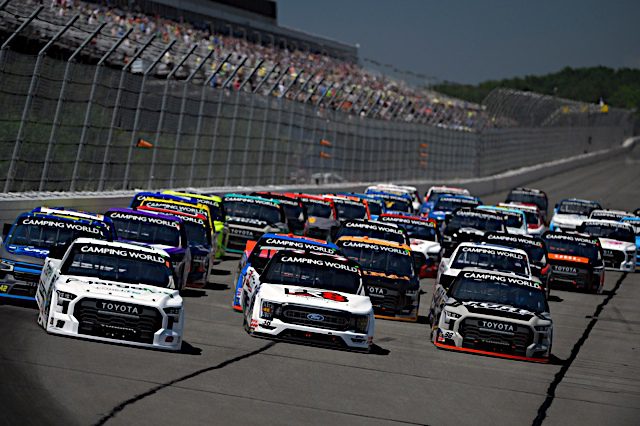The NASCAR Camping World Truck Series will next compete at Kansas Speedway on Sept. 9 to conclude the first round of its playoffs, where the field will get cut from 10 to eight. On Aug. 13, Chandler Smith put on a clinic at Richmond Raceway to lock himself into the next round.
The problem with this? Sept. 9 is almost a month after the race at Richmond.
This isn’t the first time the Truck Series has had long gaps in between its races. Before the schedule was overhauled in 2020-2021, there used to be over a month’s time between the series’ season opener at Daytona International Speedway and its second race of the season, usually at either Martinsville Speedway or Kansas. This is because the Truck Series only runs 20-23 races in a given season, compared to the Cup Series’ 36-race slate every year.
Because of these long gaps in the schedule, every so often, the question arises: Is the Truck Series’ schedule in need of expansion?
There are multiple factors that suggest that it’s fine where it is. The Truck Series is still a development series, where drivers who are making their way up the NASCAR ranks still aren’t used to racing week after week and need to ease their way into the jam-packed schedules that come with moving up through the premier series of NASCAR.
There’s also the idea that sponsors of the series maybe want less races so they don’t have to pay teams as much to sponsor a full season. And on the subject of cost, teams may not have the funds to run an expanded schedule.
However, there are several reasons suggesting that maybe the Truck Series should expand its schedule a little bit. The 2022 season consists of 23 races. The ARCA Menards Series consists of a 20-race schedule. Granted, a lot of the tracks ARCA runs are different than that of what the Truck Series runs, but if it’s only two races less than the Truck Series, then there’s a question of why a driver should race in the Truck Series if they race in ARCA.
Drivers like Sammy Smith, Ty Gibbs, Riley Herbst, and even Chase Elliott passed up on running a full-time season in the Truck Series, and instead jumped straight to the Xfinity Series.
Then there’s the aspect that drivers in the Truck Series that move up are still not prepared for how much racing they will do in the Xfinity Series. The Xfinity Series runs 33 races in a season. That is a 10-race difference compared to the Truck Series.
But it shouldn’t be a problem like it has been in years past. Truck…
Click Here to Read the Full Original Article at Frontstretch…

